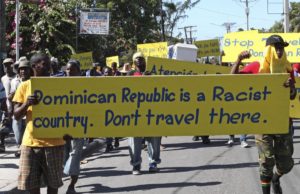
Alejandro Pierre is known as the king of bachata in his neighborhood, on the outskirts of Santo Domingo. He loves the swaying hip movements of this uniquely Dominican dance.
Pierre was born in the Dominican Republic, as was his mother. But his father was born in neighboring Haiti, and his maternal grandfather emigrated decades ago to work in the sugar cane fields. Until this week, Pierre’s Haitian origins made him ineligible for Dominican citizenship.
A constitutional court ruling eight months ago rendered stateless an estimated 210,000 people like Pierre, according to the U.N. refugee agency (UNHCR). Governments and human rights organizations have decried the policy and warned that the ruling could have unforeseen economic consequences.
This week, after intense pressure, Congress passed a law that will regularize children of migrants who have birth certificates and allow descendants of migrants who never had papers to naturalize.
The law addresses an eight-month legal standoff. In September, the constitutional court legalized actions the Dominican authorities had been making for the past 15 years – arbitrarily and then systematically denying citizenship to descendants of Haitian immigrants.
The court ruled that the plaintiff, a woman born in the republic to Haitian parents, was not Dominican. It also ordered a scan of the civil registry to identify anyone else born to migrants since 1929. The court ruling, which cannot be appealed, sealed years of deprivations of papers and legal amendments to justify the country’s citizenship policies.
The government claimed it was simply addressing long-standing immigration issues and asserting its sovereignty to manage citizenship. “Birthright is not a reason to grant Dominican nationality,” said a staff member at the Central Electoral Board, which manages civil registration. He requested anonymity as he did not have permission to grant interviews.
But researchers have already noted the impact of the ruling. “The deliberate creation of a stateless underclass increases the already formidable risks of exploitation,” said a recent report by the American Federation of Labor and Congress of Industrial Organizations. It warned that the ruling could worsen poverty among those affected because without an identity card people are relegated to informal jobs and have little bargaining power in relations with employers.
That was one of the main complaints the new law addresses. Advocates are cautiously optimistic and say that the next challenge will be the implementation process.
For the past six years, Pierre has been trying to secure a national ID card so he can work. The card is necessary for myriad bureaucratic tasks, including marriage, registering children, opening a bank account and entering public university.
Read the full story at theguardian.com

